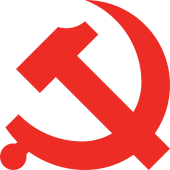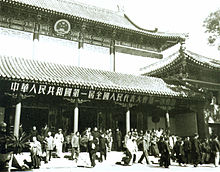Politburo of the Chinese Communist Party
Political Bureau of the Chinese Communist Party Central Committee 中国共产党中央政治局 | |
|---|---|
 | |
| Leadership | |
Status | |
Leader of the Party | |
1st-ranked member | |
Elected by | the Central Committee |
Responsible to | the Central Committee |
| Seats | 25 |
| Meeting place | |
 | |
| Huairen Hall, Zhongnanhai Beijing, China[1] | |
| Politburo of the Chinese Communist Party | |||||||
|---|---|---|---|---|---|---|---|
| Simplified Chinese | 中国共产党中央政治局 | ||||||
| Traditional Chinese | 中國共產黨中央政治局 | ||||||
| Literal meaning | China Communist Party Central Political Bureau | ||||||
| |||||||
| Politburo | |||||||
| Chinese | 政治局 | ||||||
| Literal meaning | Political Bureau | ||||||
| |||||||
 |
|---|
|
|
The Central Politburo of the Communist Party of China, formally known as the Political Bureau of the CPC Central Committee and known as Central Bureau before 1927, is a group of 25 people who oversee the Communist Party of China. Unlike politburos (political bureaus) of other Communist parties, power within the politburo is centralized in the Politburo Standing Committee, a smaller group of Politburo members.
The Politburo is nominally elected by the Central Committee. In practice, however, scholars of Chinese elite politics believe that the Politburo is a self-perpetuating body, with new members of both the Politburo and its Standing Committee chosen through a series of deliberations by current Politburo members and retired Politburo Standing Committee members. The current and former Politburo members conduct a series of informal straw polls to determine the group's level of support for each new candidate's membership in the Politburo. The process for selecting the new Politburo begins with a closed door meeting by the incumbent Politburo Standing Committee in Beidaihe in the summer before the Party Congress convenes.[2][3]
The power of the Politburo resides largely in the fact that its members generally simultaneously hold positions within the People's Republic of China state positions and with the control over personnel appointments that the Politburo and Secretariat have. In addition, some Politburo members hold powerful regional positions. How the Politburo works internally is unclear, but it appears that the full Politburo meets once a month and the standing committee meets weekly. This is believed to be much more infrequent than the former Soviet Politburo had met. The agenda for the meetings appears to be controlled by the General Secretary and decisions are made by consensus rather than by majority vote.[4]
The Politburo was eclipsed by the Secretariat of the Communist Party of China Central Committee in the early 1980s under Hu Yaobang,[5] but has re-emerged as a dominant force after Hu's ousting in 1987.
Current Politburo
The 19th Politburo was elected at the first plenary session of the 19th Central Committee in October 2017.
- Keys
| Abbreviations | |
|---|---|
| IDUCC | Institutions Directly Under the Central Committee |
| K | Keys |
| CIM | Central institution membership, which in this instance means membership in the PSC, PB, ST and CMC |
| PSC | Standing Committee of the Political Bureau |
| PB | Political Bureau |
| ST | Secretariat |
| CMC | Central Military Commission |
| SC–CCDI | Standing Committee of the Central Commission for Discipline Inspection |
| CCDI | Central Commission for Discipline Inspection |
| CPPCC | Chinese People's Political Consultative Conference |
| NL | National Leader |
| DNL | Deputy National Leader |
| PM | Provincial-Ministerial |
| SPM | Sub-provincial (vice-ministerial) |
| DE | Department-prefecture level |
| Adm. | Admiral |
| V-Adm. | Vice-Admiral |
| Gen. | General |
| Lt. Gen. | Lieutenant General |
| Maj. Gen. | Major General |
| Keys | |
| ♀ | Indicates that the individual is female. |
| ↑ | Indicates that the individual was elevated from alternate to full member |
| ♮ | Indicates that the individual was expelled from the Communist Party after CCDI investigation. |
| ₪ | Indicates that the individual is currently under investigation by the CCDI. |
| ∞ | Indicates that the individual is retired from active political positions[note 1] |
| § | Indicates that the individual is military personnel. |
| ↔ | Indicates that the individual is military personnel and has retired from active military service. |
| Note | If two keys are used in the same column it indicates that the individual is both of something. For instance, "♀§" indicates that the individual is female (♀) and military personnel (§). |
Notes
- ^ "Active" political positions refer to the offices of Governor and provincial-level Party Secretary; often, an individual is considered retired when they relinquish either of those offices due to age, and are assigned some kind of committee membership in the National People's Congress.
References
- ^ Wang, Jun (15 June 2013). "中央政治局如何开会". qikan.com. Retrieved 18 October 2017.
- ^ Li, Cheng (2016). Chinese Politics in the Xi Jinping Era: Reassessing Collective Leadership. Brookings Institution Press. ISBN 9780815726937. Retrieved 18 October 2017.
- ^ Kang Lim, Benjamin (20 November 2017). "Exclusive: China's backroom powerbrokers block reform candidates - sources". Reuters. Retrieved 18 October 2017.
- ^ Miller, H. "Hu Jintao and the Party Politburo" (PDF). China Leadership Monitor. Hoover Institution. p. 5. Retrieved 15 October 2011.
- ^ Li, Cheng et al. (2008). China's Changing Political Landscape, Washington: Brookings Institution Press. ISBN 978-0-8157-5209-7.
- ^ "The 20th Politburo". South China Morning Post. 21 November 2022. Archived from the original on 15 March 2023. Retrieved 21 July 2023.
- ^ Li, Cheng. "Cai Qi 蔡奇" (PDF). Brookings Institution. Archived from the original (PDF) on 31 May 2023. Retrieved 21 July 2023.
- ^ "Chen Jining appointed Shanghai Party chief". China Daily. 28 October 2022. Archived from the original on 22 July 2023. Retrieved 22 July 2023.
"Chen Jining 陈吉宁". China Vitae. Archived from the original on 22 July 2023. Retrieved 22 July 2023. - ^ Li, Cheng. "Chen Min'er 陈敏尔" (PDF). Brookings Institution. Archived from the original (PDF) on 31 May 2023. Retrieved 22 July 2023.
- ^ "Brief introductions of members of CPC central leading bodies". State Council of the People's Republic of China. 24 October 2022. Archived from the original on 22 July 2023. Retrieved 22 July 2023.
"Chen Wenqing 陈文清". China Vitae. Archived from the original on 22 July 2023. Retrieved 22 July 2023. - ^ Li, Cheng. "Ding Xuexiang 丁薛祥" (PDF). Brookings Institution. Archived from the original (PDF) on 30 May 2023. Retrieved 21 July 2023.
- ^ Pei, Minxin (1 June 2023). "Xi Jinping's New Economic Team and Government Re-organization". China Leadership Monitor. Archived from the original on 22 July 2023. Retrieved 22 July 2023.
"He Lifeng 何立峰". China Vitae. Archived from the original on 22 July 2023. Retrieved 22 July 2023. - ^ Jiayao, Li (11 March 2023). "He Weidong -- Vice Chairman of the CPC Central Military Commission". China Military. Archived from the original on 22 July 2023. Retrieved 22 July 2023.
- ^ Li, Cheng. "Huang Kunming 黄坤明" (PDF). Brookings Institution. Archived from the original (PDF) on 31 May 2023. Retrieved 22 July 2023.
- ^ "China puts scientist in charge of Communist Party's human resources department". South China Morning Post. 27 April 2023. Archived from the original on 27 April 2023. Retrieved 22 July 2023.
"Li Ganjie 李干杰". China Vitae. Archived from the original on 22 July 2023. Retrieved 22 July 2023. - ^ "Brief introduction of vice chairpersons, secretary-general of 14th NPC Standing Committee". People's Daily. 11 March 2023. Archived from the original on 22 July 2023. Retrieved 22 July 2023.
"Li Hongzhong 李鸿忠". China Vitae. Archived from the original on 22 July 2023. Retrieved 22 July 2023. - ^ Li, Cheng. "Li Qiang 李强" (PDF). Brookings Institution. Archived from the original (PDF) on 11 July 2023. Retrieved 21 July 2023.
- ^ Mai, Jun (13 March 2023). "Politburo newcomer and Xi protégé confirmed as China's new propaganda chief before presenting summary of party congress". South China Morning Post. Archived from the original on 27 October 2022. Retrieved 22 July 2023.
"Li Shulei 李书磊". China Vitae. Archived from the original on 22 July 2023. Retrieved 22 July 2023. - ^ Li, Cheng. "Li Xi 李希" (PDF). Brookings Institution. Archived from the original (PDF) on 28 October 2022. Retrieved 21 July 2023.
- ^ "Liu Guozhong -- Vice premier". State Council of the People's Republic of China. 13 March 2023. Archived from the original on 22 July 2023. Retrieved 22 July 2023.
"Liu Guozhong 刘国中". China Vitae. Archived from the original on 22 July 2023. Retrieved 22 July 2023. - ^ Li, Cheng. "Ma Xingrui 马兴瑞" (PDF). Brookings Institution. Archived from the original (PDF) on 6 December 2022. Retrieved 21 July 2023.
- ^ "Shi Taifeng". National Committee of the Chinese People's Political Consultative Conference. 11 March 2023. Archived from the original on 22 July 2023. Retrieved 22 July 2023.
- ^ Li, Cheng. "Wang Huning 王沪宁" (PDF). Brookings Institution. Archived from the original (PDF) on 19 November 2022. Retrieved 21 July 2023.
- ^ "Wang Yi". Ministry of Foreign Affairs. Archived from the original on 22 July 2023. Retrieved 22 July 2023.
- ^ Li, Cheng. "Xi Jinping 习近平" (PDF). Brookings Institution. Archived from the original (PDF) on 24 May 2023. Retrieved 21 July 2023.
- ^ "Yin Li 尹力". China Vitae. Archived from the original on 22 July 2023. Retrieved 22 July 2023.
- ^ "Brief introductions of members of CPC central leading bodies". China Daily. 24 October 2022. Archived from the original on 22 July 2023. Retrieved 22 July 2023.
"Yuan Jiajun 袁家军". China Vitae. Archived from the original on 22 July 2023. Retrieved 22 July 2023. - ^ "Zhang Guoqing -- Vice premier". State Council of the People's Republic of China. 13 March 2023. Archived from the original on 22 July 2023. Retrieved 22 July 2023.
"Zhang Guoqing 张国清". China Vitae. Archived from the original on 22 July 2023. Retrieved 22 July 2023. - ^ Li, Cheng. "Zhang Youxia 张又侠" (PDF). Brookings Institution. Archived from the original (PDF) on 23 October 2022. Retrieved 22 July 2023.
Li Jiayao (11 March 2023). "Zhang Youxia -- Vice Chairman of the CPC Central Military Commission". China Military. Archived from the original on 22 July 2023. Retrieved 22 July 2023. - ^ Li, Cheng. "Zhao Leji 赵乐际" (PDF). Brookings Institution. Archived from the original (PDF) on 25 December 2022. Retrieved 21 July 2023.
External links
- "Hu Jintao and the Party Politburo", Winter 2004: Party Affairs, By Alice L. Miller, China Leadership Monitor No. 9
- www.nodulo.org Pictures of the members (Spanish)
